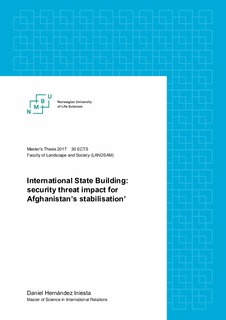| dc.contributor.advisor | Divon, Shai André | |
| dc.contributor.advisor | Merchant, Karim | |
| dc.contributor.author | Hernández Iniesta, Daniel Adelino | |
| dc.coverage.spatial | Afghanistan | nb_NO |
| dc.date.accessioned | 2017-09-28T10:52:38Z | |
| dc.date.available | 2017-09-28T10:52:38Z | |
| dc.date.issued | 2017 | |
| dc.identifier.uri | http://hdl.handle.net/11250/2457272 | |
| dc.description.abstract | A country’s internal political stability allows the scenario where a state can develop its economy and relations with other states. However, this desired internal stability often goes hand in hand with a high level of desired security state citizens. The international community evaluates states according to their level of security threat to global terrorism, largely by Daesh and Al Qaeda. In previous years the international community evaluated states’ ability to cope with security threats to a country’s independence. In addition to states’ interest to outwardly exercise influence for their own self-interest, it is very relevant to analyse how states gain UN support to intervene in another state (i.e. Iraq in 1990 and 2003, or more pertinently, Afghanistan in 2001).
Furthermore, the way the international community uses security threats to exercise influence in another country is a factor that impacts on a country’s stability and state building. Therefore, the impact of security threats to justify an international community intervention in another country is not only a general aspect to study in international relations, but a factor that has historically influenced Afghanistan. Thus, the influence of security threats from the international community, on Afghanistan’s state building is a relevant case to study for international relations and is the topic of this thesis. In order to evaluate the international community’s influence over Afghanistan’s internal stability, I identified the impact of security threats on Afghan governance and economic and social development as two areas that affect Afghanistan’s state building. | nb_NO |
| dc.language.iso | eng | nb_NO |
| dc.publisher | Norwegian University of Life Sciences, Ås | nb_NO |
| dc.rights | Attribution-NonCommercial-NoDerivatives 4.0 Internasjonal | * |
| dc.rights.uri | http://creativecommons.org/licenses/by-nc-nd/4.0/deed.no | * |
| dc.subject | Governance | nb_NO |
| dc.subject | International community | nb_NO |
| dc.subject | Security threat | nb_NO |
| dc.subject | Securitisation | nb_NO |
| dc.subject | Stabilisation | nb_NO |
| dc.subject | State building | nb_NO |
| dc.title | International state building : security threat impact for Afghanistan’s stabilisation’ | nb_NO |
| dc.type | Master thesis | nb_NO |
| dc.subject.nsi | VDP::Social science: 200 | nb_NO |
| dc.source.pagenumber | 124 | nb_NO |
| dc.description.localcode | M-IR | nb_NO |

